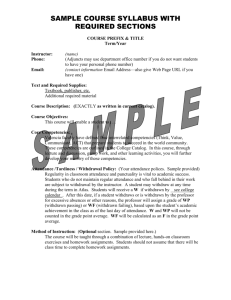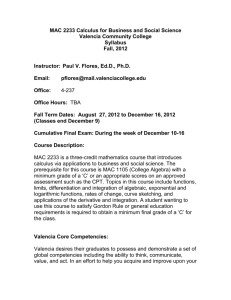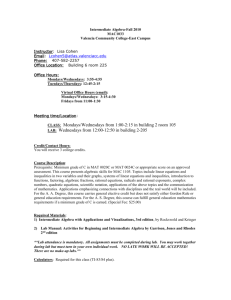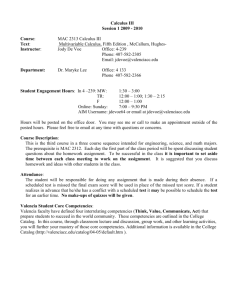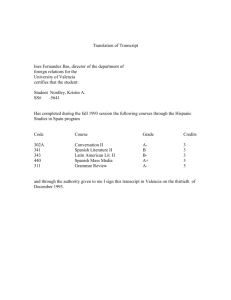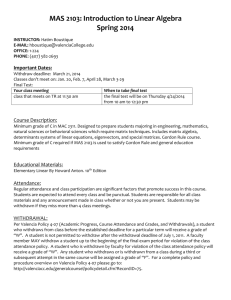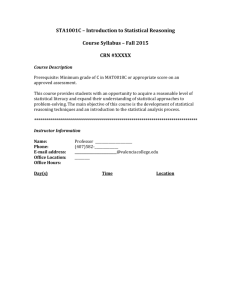Principles of Management
advertisement
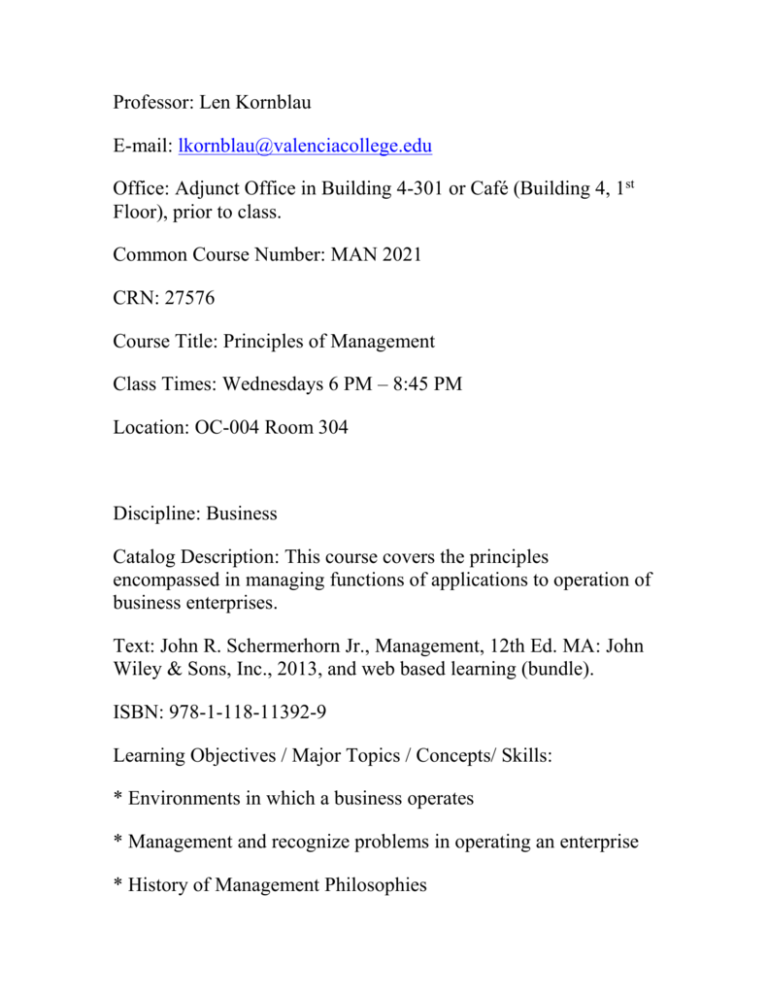
Professor: Len Kornblau E-mail: lkornblau@valenciacollege.edu Office: Adjunct Office in Building 4-301 or Café (Building 4, 1st Floor), prior to class. Common Course Number: MAN 2021 CRN: 27576 Course Title: Principles of Management Class Times: Wednesdays 6 PM – 8:45 PM Location: OC-004 Room 304 Discipline: Business Catalog Description: This course covers the principles encompassed in managing functions of applications to operation of business enterprises. Text: John R. Schermerhorn Jr., Management, 12th Ed. MA: John Wiley & Sons, Inc., 2013, and web based learning (bundle). ISBN: 978-1-118-11392-9 Learning Objectives / Major Topics / Concepts/ Skills: * Environments in which a business operates * Management and recognize problems in operating an enterprise * History of Management Philosophies * Current Management Trends * Managing Resources * Changing factors that influence management and careers Important Dates: Term Course (Class Meetings): January 14 through April 22, 2015 Spring Break: March 11, 2015 Withdrawal Deadline (To receive a “W”) March 27, 2015 Final Exam: April 29, 2015 6:30 PM Per Valencia Policy 4-07 (Academic Progress, Course Attendance and Grades, and Withdrawals), a student who withdraws from class before the withdrawal deadline of (March 27, 2015) will receive a grade of “W.” A student is not permitted to withdraw after the withdrawal deadline. A faculty member MAY withdraw a student up to the beginning of the final exam period for violation of the class attendance policy. A student who is withdrawn by faculty for violation of the class attendance policy will receive a grade of “W.” Any student who withdraws or is withdrawn from a class during a third or subsequent attempt in the same course will be assigned a grade of “F.” For a complete policy and procedure overview on Valencia Policy 4-07 please go to: http://valenciacc.edu/generalcounsel/policydetail.cfm?RecordID=7 5. Students are personally required to process their own withdrawal. Participation/Attendance: The College believes that regular attendance and class participation are significant factors, which promote success in college. Students are expected to attend all classes in which they are enrolled (Policy 6Hx28:10-22). Each professor determines the specific attendance policy for his/her class, but attendance must be recorded for each student.” If a student does not regularly attend and participate in the class activities, the Instructor may drop the student from the class as an "F" or "W" at the professor's discretion. Attendance: Students are expected to attend each class and arrive ON TIME. Late arrivals may be marked absent at the instructor’s discretion. Three late arrivals automatically equal one unexcused absence. Students are expected to advise instructor in writing PRIOR to class if they plan to be absent. Three unexcused absences will result in the Instructor dropping the student from the course. Evaluation Process: Final Grades will be calculated as follows: Participation in Class = 20% Tests = 30% Assignments/Case Studies = 20% Final Course Project = 30% (20% Content, 10% Presentation) Total possible points Grades: 90-100 pts. = A, 80-89 pts. = B, 70-79 pts. = C, 65-69 pts. = D, Less than 65 pts. = F. = 100% Grading/class policies: All chapter tests must be taken on or before dates assigned. No makeup tests are available without explicit consent from the Professor, which will only be granted in case of documented extreme emergency. Homework assignments and tests will not be accepted late. Course Procedures: 1. Read assigned text chapters: Reading the textbook is critical to learning the material. Not all chapter material will be covered in class, yet MAY appear on tests. Check the Course Schedule to determine when chapters will be covered. Students should read complete chapters well before class periods. 2. Participate in Class Discussions; Attendance and class participation are mandatory (see College catalog). Students are expected to respond to the instructor’s questions. Quality of responses is more important than quantity. 3. Check Blackboard and Valencia e-mail. Students are responsible for the contents of all e-mail notifications and Blackboard postings, content and notices. ***Proofread and spell-check all your writing before submitting them to earn full participation points. *** Proper grammar, punctuation and spelling are essential components of business communication. Points will be deducted for errors with punctuation, spelling and proper grammar. 4. Homework and web based assignments: Web based assignments are due per schedule on web site. Case Studies will be e-mailed by deadlines posted. Late assignments may not be accepted, and if accepted will earn fewer points than the maximum allocated. 5. Chapter Tests: All chapter tests will be taken in class. No makeup tests are available without explicit consent of Professor, which will only be granted in case of documented extreme emergency and in accordance with college policy. There is NO make up for the Final Exam. 6. Final Course Project: Each student will be assigned one chapter of the text and apply personal professional experience or observations, plus research from the databases available from the Valencia College Library. Students will create a 10-minute presentation, which will include both a series of slides and some form of interactivity with the class. All presentations will take place on April 22, 2015. Instructor will make assignments and all presentations must be e-mailed to the instructor PRIOR to the start of class on April 22, 2015. 7. Extra Credit: The ONLY extra credit in this course is for perfect attendance, which is defined simply as: If the instructor is present, so are you. Excused absences negate perfect attendance. The additional credit will be five points added to your semester grade, which may (but not necessarily) raise your grade to the next level with a maximum of an A. Computer Policy: Use of computers in the Business, IT and Public Services classrooms at Valencia College is restricted to those activities designated by the Instructors to enhance the class materials. Any other use is strictly forbidden. Inappropriate use includes, but is not limited to: * Use of computer to send E-mail or access Internet sites not specifically assigned in class. * Use of computer for job, internship, homework or other activities not assigned in class. * Modifying any hardware or software system configuration or setting. * Activities not in accordance with the Valencia Student Code of Conduct. * Use of computers in the departmental open lab is limited to those activities involved with preparing homework or coursework in this department and is subject to the same restriction as listed above. * Computer use is remotely monitored; any student using computers inappropriately may be subject to dismissal from class or banishment from the lab. * Subsequent offense may be sent to the campus administration for further disciplinary action. Cell Phones: All phones must be turned off or silenced during class unless instructed otherwise. Instructor will indicate when phones/tablets/computers may be used to research class material. They may be used for note taking but beware the following: Texting is NOT acceptable classroom behavior, and may reduce your classroom participation grade. Continued texting will be considered an absence, and you may be asked to leave the class. Students with Disabilities: Students with disabilities who qualify for academic accommodations must provide a notification from the Office for Students with Disabilities (OSD) and discuss specific needs with the Instructor, preferably during the first two weeks of class. The Office for Students with Disabilities determines accommodations based on appropriate documentation of disabilities. Expected Student Conduct: Valencia College is dedicated not only to the advancement of knowledge and learning but is concerned with the development or responsible personal and social conduct. By enrolling at Valencia College, a student assumes the responsibility for becoming familiar with and abiding by the general rules of conduct. The primary responsibility for managing the classroom environment rests with the faculty. Students who engage in any prohibited or unlawful acts that result in disruption of a class may be directed by the faculty to leave the class. Violation of any classroom or Valencia’s rules may lead to disciplinary action up to and including expulsion from Valencia. Disciplinary action could include being withdrawn from class, disciplinary warning, probation, suspension, expulsion, or other appropriate and authorized actions. You will find the Student Code of Conduct in the current Valencia Student Handbook. Online Student Conduct: Please keep all communications professional and free of profanity, “fighting words”, etc. Please remember that it is impossible to read the emotions of the person writing or receiving information. While you may say something “in jest” others may not be able to interpret that. Avoid saying anything you don’t mean literally. Valencia I.D. Cards: Valencia I.D. cards are required in order to use the LRC, Testing Center, and IMC. Cards are free and can be obtained in the Student Development office. Academic Dishonesty: All forms of academic dishonesty are prohibited at Valencia College. Academic dishonesty includes, but is not limited to, plagiarism, cheating, furnishing false information, forgery, alteration or misuse of documents, misconduct during a testing situation, and misuse of identification with intent to defraud or deceive. Students shall take special notice that the assignment of course grades is the responsibility of the student's individual professor. When the professor has reason to believe that an act of academic dishonesty has occurred, and before sanctions are imposed, the student shall be given informal notice and an opportunity to be heard by the professor. Any student determined by the professor to have been guilty of engaging in an act of academic dishonesty shall be subject to a range of academic penalties as determined by the professor. These penalties may include, but not be limited to, one or more of the following: * Loss of credit for an assignment, examination, or project; * Reduction in the course grade; * Or a grade of "F" in the course. At the option of the professor, the appropriate administrator of the campus may be furnished with written notification of the occurrence and the action taken. If such written notice is given, a copy shall be provided to the student. Students guilty of engaging in a gross or flagrant act of academic dishonesty or repeated instances of academic dishonesty shall also be subject to administrative and/or disciplinary penalties that may include warning, probation, suspension, and/or expulsion from the college. Disclaimer Statement: This syllabus and the course schedule may be altered, at the Professor’s discretion, during the course of the term. It is the responsibility of the student to make any changes mandated by changes in the syllabus and/or Course Schedule. Schedule of Classes: January 14: Introduction, Syllabus, Projects, and Chapter 1: Introducing Management January 21: Chapter 2: Management Learning past to Present And Chapter 3: Ethics and Responsibility January 28: Chapter 4: Environment, Innovation and Sustainability And Chapter 5: Global Management and Cultural Diversity February 4: Test on Chapters 1-5 February 11: Chapter 6: Entrepreneurship and New Ventures And Chapter 7: Information and Decision Making February 18: Chapter 8: Planning Processes and Techniques And Chapter 9: Control Processes and Systems February 25: Test on Chapters 6-9 March 4: Chapter 10: Strategy and Strategic Management And Chapter 11: Organization Structure and Design March 11: SPRING BREAK March 18: Chapter 12: Organization Culture and Change And Chapter 13: Human Resource Management March 25: Test on Chapters 10-13 April 1: Chapter 14: Leadership and Leadership Development April 8: Chapter 15: Individual Behavior And Chapter 16: Motivational Theory & Practice April 15: Chapter 17: Teams and Teamwork And Chapter 18: Communication and Collaboration April 22: Presentation of Projects April 29: 6:30 PM Final Exam (primarily Chapters 14-18 plus questions from previous chapters)
